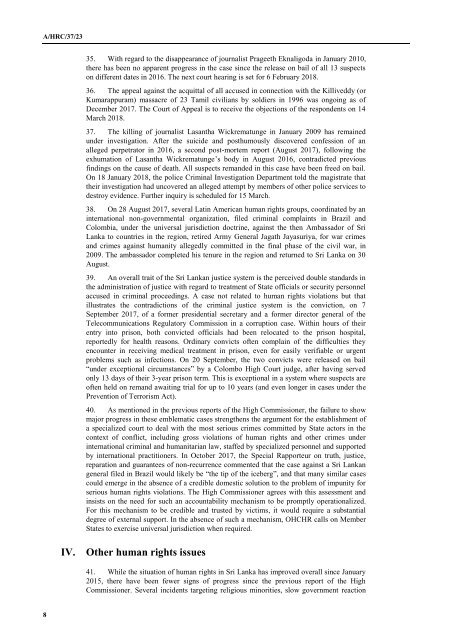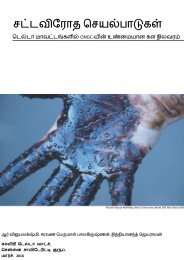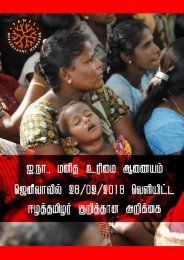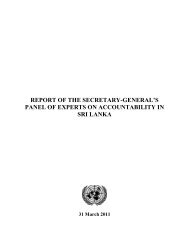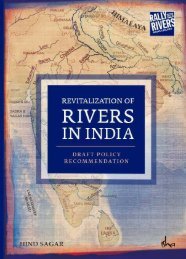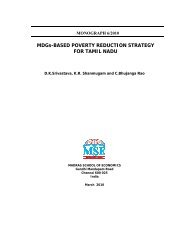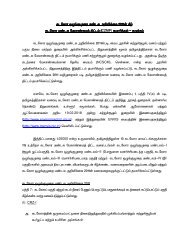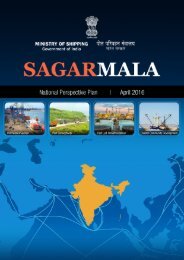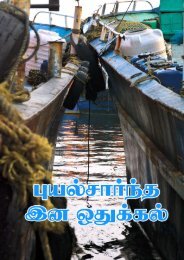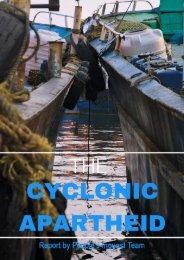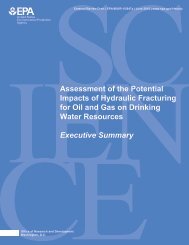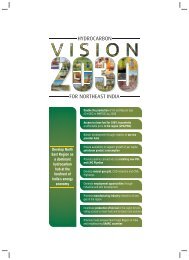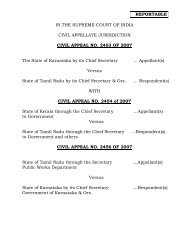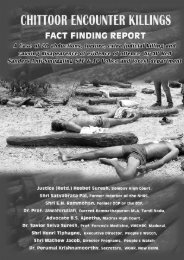UN High Commissioner report Sri Lanka Feb 2018
Create successful ePaper yourself
Turn your PDF publications into a flip-book with our unique Google optimized e-Paper software.
A/HRC/37/23<br />
35. With regard to the disappearance of journalist Prageeth Eknaligoda in January 2010,<br />
there has been no apparent progress in the case since the release on bail of all 13 suspects<br />
on different dates in 2016. The next court hearing is set for 6 <strong>Feb</strong>ruary <strong>2018</strong>.<br />
36. The appeal against the acquittal of all accused in connection with the Killiveddy (or<br />
Kumarappuram) massacre of 23 Tamil civilians by soldiers in 1996 was ongoing as of<br />
December 2017. The Court of Appeal is to receive the objections of the respondents on 14<br />
March <strong>2018</strong>.<br />
37. The killing of journalist Lasantha Wickrematunge in January 2009 has remained<br />
under investigation. After the suicide and posthumously discovered confession of an<br />
alleged perpetrator in 2016, a second post-mortem <strong>report</strong> (August 2017), following the<br />
exhumation of Lasantha Wickrematunge’s body in August 2016, contradicted previous<br />
findings on the cause of death. All suspects remanded in this case have been freed on bail.<br />
On 18 January <strong>2018</strong>, the police Criminal Investigation Department told the magistrate that<br />
their investigation had uncovered an alleged attempt by members of other police services to<br />
destroy evidence. Further inquiry is scheduled for 15 March.<br />
38. On 28 August 2017, several Latin American human rights groups, coordinated by an<br />
international non-governmental organization, filed criminal complaints in Brazil and<br />
Colombia, under the universal jurisdiction doctrine, against the then Ambassador of <strong>Sri</strong><br />
<strong>Lanka</strong> to countries in the region, retired Army General Jagath Jayasuriya, for war crimes<br />
and crimes against humanity allegedly committed in the final phase of the civil war, in<br />
2009. The ambassador completed his tenure in the region and returned to <strong>Sri</strong> <strong>Lanka</strong> on 30<br />
August.<br />
39. An overall trait of the <strong>Sri</strong> <strong>Lanka</strong>n justice system is the perceived double standards in<br />
the administration of justice with regard to treatment of State officials or security personnel<br />
accused in criminal proceedings. A case not related to human rights violations but that<br />
illustrates the contradictions of the criminal justice system is the conviction, on 7<br />
September 2017, of a former presidential secretary and a former director general of the<br />
Telecommunications Regulatory Commission in a corruption case. Within hours of their<br />
entry into prison, both convicted officials had been relocated to the prison hospital,<br />
<strong>report</strong>edly for health reasons. Ordinary convicts often complain of the difficulties they<br />
encounter in receiving medical treatment in prison, even for easily verifiable or urgent<br />
problems such as infections. On 20 September, the two convicts were released on bail<br />
“under exceptional circumstances” by a Colombo <strong>High</strong> Court judge, after having served<br />
only 13 days of their 3-year prison term. This is exceptional in a system where suspects are<br />
often held on remand awaiting trial for up to 10 years (and even longer in cases under the<br />
Prevention of Terrorism Act).<br />
40. As mentioned in the previous <strong>report</strong>s of the <strong>High</strong> <strong>Commissioner</strong>, the failure to show<br />
major progress in these emblematic cases strengthens the argument for the establishment of<br />
a specialized court to deal with the most serious crimes committed by State actors in the<br />
context of conflict, including gross violations of human rights and other crimes under<br />
international criminal and humanitarian law, staffed by specialized personnel and supported<br />
by international practitioners. In October 2017, the Special Rapporteur on truth, justice,<br />
reparation and guarantees of non-recurrence commented that the case against a <strong>Sri</strong> <strong>Lanka</strong>n<br />
general filed in Brazil would likely be “the tip of the iceberg”, and that many similar cases<br />
could emerge in the absence of a credible domestic solution to the problem of impunity for<br />
serious human rights violations. The <strong>High</strong> <strong>Commissioner</strong> agrees with this assessment and<br />
insists on the need for such an accountability mechanism to be promptly operationalized.<br />
For this mechanism to be credible and trusted by victims, it would require a substantial<br />
degree of external support. In the absence of such a mechanism, OHCHR calls on Member<br />
States to exercise universal jurisdiction when required.<br />
IV. Other human rights issues<br />
41. While the situation of human rights in <strong>Sri</strong> <strong>Lanka</strong> has improved overall since January<br />
2015, there have been fewer signs of progress since the previous <strong>report</strong> of the <strong>High</strong><br />
<strong>Commissioner</strong>. Several incidents targeting religious minorities, slow government reaction<br />
8


